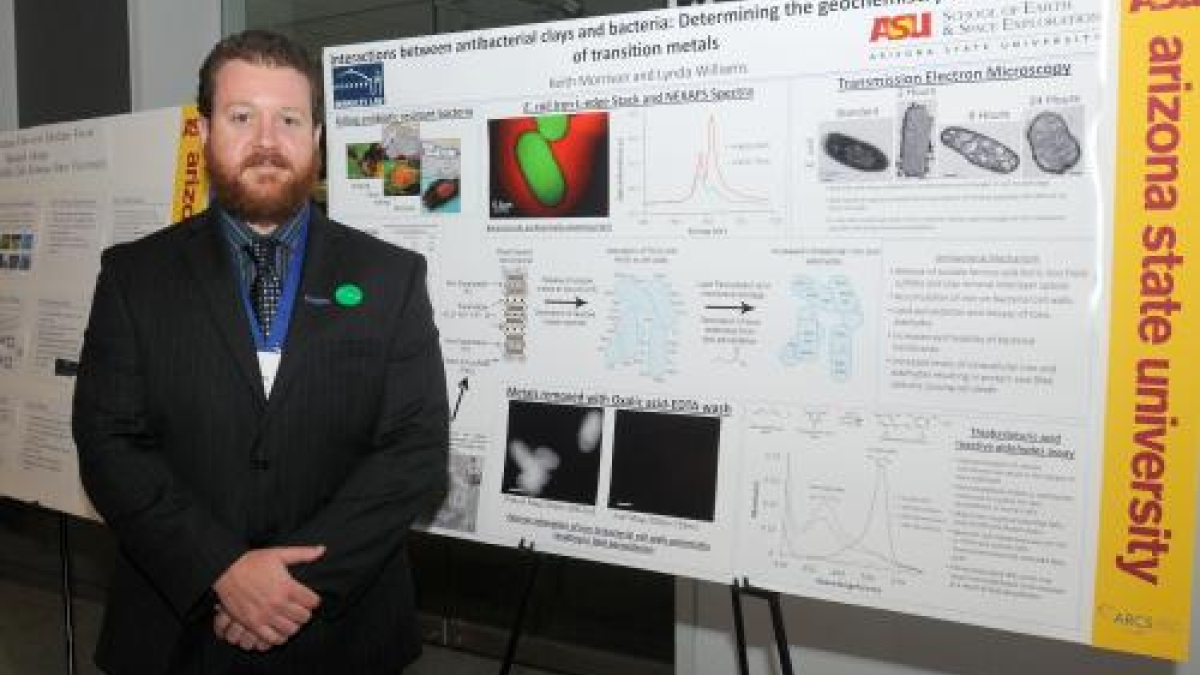Student studying antibacterial clays honored at ARCS Phoenix awards dinner

The ARCS Foundation Phoenix recently honored 38 young scientists from Arizona State University, Northern Arizona University and University of Arizona. Each recipient is pursuing a doctoral degree in science. Keith Morrison, a graduate student in the School of Earth and Space Exploration at Arizona State University, received one of the ARCS awards this year.
Each recipient receives an ARCS Foundation Scholar award of $7,000. This award is funded by individual donors of the ARCS chapter who find the research topic of interest. Their goal is to promote the success of science and engineering by U.S. citizens.
Morrison is a third year doctoral student in the School of Earth and Space Exploration. He received his bachelor's of science in environmental toxicology and master's of science in earth sciences at the University of California Riverside. His current research is focused on antibacterial clays which have the ability to kill antibiotic resistant strains of bacteria. He is currently investigating the antibacterial mechanism using scanning transmission X-ray microscopy at the Advanced Light Source (Berkeley, Calif.) to map the uptake and redox chemistry of soluble transition metals interacting with fully hydrated bacteria and biofilms.
The award banquet was held at the Phoenix Art Museum on April 26. Before dinner the scholars presented their research posters to the attendees. The evening culminated with the scholars saying a few words about their groundbreaking research and expressing heartwarming gratitude to their donors.
“My PhD research on antibacterial clays has provided an interdisciplinary approach to scientific research and established many ongoing collaborations,” said Morrison. “Our research group is challenging traditional scientific paradigms in an attempt to identify novel mineral-based antibacterial agents that are effective in killing antibiotic resistant bacteria. I was honored to receive this award and I would like to thank Ellie and Michael Ziegler for their generous donation and interest in my research.”
Prior to coming to ASU to work on his doctorate Morrison started working with professor Lynda Williams on her clay research – funded at that time by the National Institutes of Health and now funded by the National Science Foundation's geobiology program. In the summer of 2008 he conducted fieldwork with Williams, now his advisor, to explore the geology of a novel antibacterial clay deposit in southern Oregon.
“Keith is an unusually self-motivated student and his enthusiasm and intellect showed during our field season so we agreed to work together on this exciting new application of minerals in medicine. Keith quickly understood the importance of making his dissertation an independent subset of my funded research project, and has diligently pursued research methods that will enhance our understanding of the biogeochemical processes that make certain minerals antibacterial,” Williams said.
According to Williams, Morrison “has shown a breadth of knowledge in organic geochemistry, microbiology and clay mineralogy and he vigorously pursues new methodologies to answer interdisciplinary questions that will lead us to harness the natural antibacterial processes, and apply them to produce new medicinal agents.”
The ARCS Foundation, Inc. dates to the late 1950’s and was the response of a group of California women to Sputnik. Their goal was to encourage and support outstanding U.S. students in the study of science and technology.
The School of Earth and Space Exploration is an academic unit of the College of Liberal Arts & Sciences